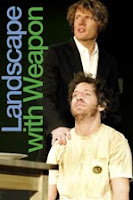Let me try, from memory and a few notes, conclude my comments on the week, concentrating on our day in Stratford on Thursday through our departure Sunday morning.
I won’t follow chronology exactly because in an earlier blog, written on Saturday, I shared some observations of our encounter at tea on Friday with Tristam (!) who played Peter’s role in A MATTER OF LIFE AND DEATH, but otherwise ignored events of Thursday and Friday.

We were well prepared for this year’s Lear thanks to an ingratiating visit with Jonathan Hyde (“Kent”) before the performance. I found that meeting him (he and all of the persons who addressed our group were riveting in style – they all spoke at times directly to each of our group – as well as substance, but Jonathan was perhaps the most engaging) particularly fortuitous. Of course, the play casts its heroes and villains without much subtlety, but I found that after meeting “Kent” I had a clear rooting interest; I cared less, alas for Lear than I did for Kent. Alas, neither audience nor chance were asked to rewrite the ending. I took away from our visit to Stratford:
· Shakespeare was reared by an upcoming, ambitious father and may not have been quite the country bumpkin (that seems a word taken from Shakespeare) the Oxfordians portray him as. Carolyn, incidentally, has more to say to support the notion that Shakespeare did, in fact, write what he is credited for.
· The type of stage influences the production. Here, in the temporary theater which the town insists self-destructs in five years, the thrust into the audience added greatly to entrances and retreats, involved the audience frequently, but also interrupted sight lines.
· Even at the Vatican of Shakespeareana, cutting a play is allowed and, as we learned, costuming choices abound.
· The recordings of great speeches at the Globe made clear that readings vary tremendously and that emphases sometime accord with timebound styles.
· If you want to see the actors after the performance, the Dirty Dog is the place to be. (Query: is there a place to which they go to drink BEFORE the performance?)
· The return of Frances Barber as Goneril was not matched with any acting pyrotechnics. Indeed, her previously repressed younger sister, Regan, physically demonstrated a blood-thirstiness at Gloucester’s blinding that was, for me, the most notable aspect of the production, eclipsing even Lear’s brief nudity. I was reminded of the appalling savagery of some our troops during the hazing and humiliating of prisoners at Abu Gharib. How civilized are any of us when faced with the humiliation of enemies? Do we not have to remind ourselves of our common humanity whenever tempted to extol our schaudenfreude? (There’s a good chance that at least one of you will correct my German spelling.)
Quite rightly, so much of our language and, more important, our metaphors stem from the Bard of Avon. It was a privilege, on the same trip, to visit both the Globe and  Stratford and to find Shakespeare as living theater.
Stratford and to find Shakespeare as living theater.

- Bill
 although I had hoped it might be served without interrupting discussions. Dinner “in the neighborhood” was a fitting end to an exciting week. Most of us had time to pursue a few personal missions while in
although I had hoped it might be served without interrupting discussions. Dinner “in the neighborhood” was a fitting end to an exciting week. Most of us had time to pursue a few personal missions while in 
 its hero can be metaphorically or otherwise labeled “uplifting,” but you had to be there to appreciate it. Carolyn accompanied Maria and me on our holy tour of Westminster Abbey and
its hero can be metaphorically or otherwise labeled “uplifting,” but you had to be there to appreciate it. Carolyn accompanied Maria and me on our holy tour of Westminster Abbey and 












